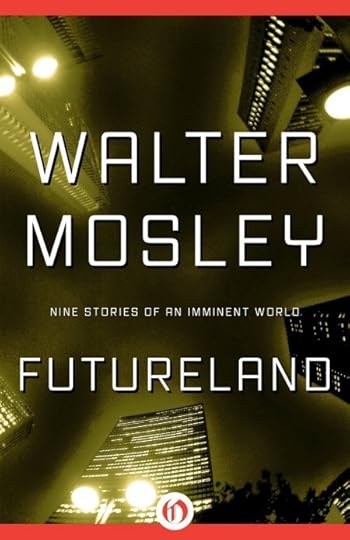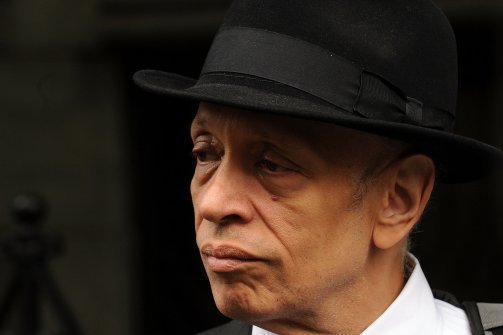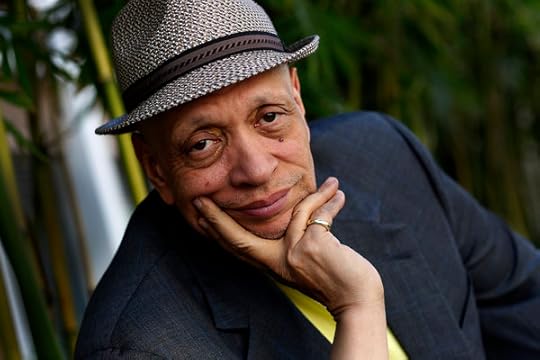Walter Mosley's Blog, page 13
February 25, 2014
Odyssey (Vintage Original) for Kindle
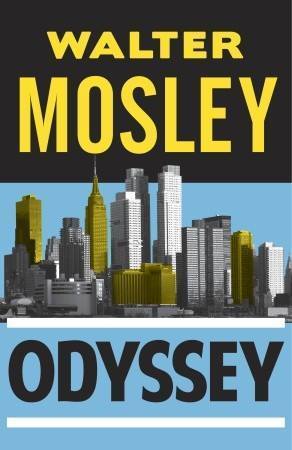 Visit Amazon.com to pick-up your copy of Odyssey (Vintage Original) Kindle Edition for $1.99!
Visit Amazon.com to pick-up your copy of Odyssey (Vintage Original) Kindle Edition for $1.99!
November 25, 2013
Laurence Fishburne To Produce & Star In HBO Drama Based On Walter Mosley’s Socrates Fortlow Novels
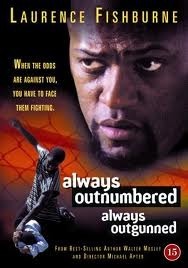
Fifteen years after Laurence Fishburne starred as Walter Mosley‘s Socrates Fortlow in the HBO movie Always Outnumbered written by Mosley and directed by Michael Apted, the actor-producer is revisiting the character for HBO, this time on the series side. The pay cable network is developing The Right Mistake, a drama series from Fishburne’s Cinema Gypsy Prods and Fox Television Studios. It is based on the series of novels by Mosley featuring Fortlow: an ex-convict who seeks redemption — while battling inner demons and external forces — after serving 27 years in prison. The books include Always Outnumbered, Always Outgunned, Walkin’ The Dog and The Right Mistake. Mosley and Patrick Charles are co-writing the series adaptation, with Fishburne attached to star. He is executive producing with Cinema Gypsy’s Helen Sugland and Tom Russo as well as Mosley and his partner, Diane Houslin. Charles is co-executive producing. The Right Mistake stems from the Cinema Gypsy’s first-look cable deal with FtvS. On the broadcast side, Cinema Gypsy has Black-ish, a single-camera comedy starring Anthony Anderson and written by Kenya Barris in development at ABC. The Matrix and CSI alum Fishburne, repped by Paradigm, Landmark Artist Management and Del, Shaw, also has a major recurring role on NBC’s Hannibal.
(via deadline.com)
July 19, 2013
July 19, 2013 – Amazon Kindle Daily Deal
July 18, 2013
Living in the Land of the Free Doesn’t Make You Free
When he was a teenage author, Walter Mosley learned that African-American men like himself faced different laws and rights than his peers. In the wake of the verdict in the Trayvon Martin case, he says nothing has changed—and asks what we’re going to do about it.
I remember when I was 17 years old, in 1969; three of my friends dropped by in one of their cars and asked me if I wanted to go out with them to the beach or the woods, I forget which. I told my father that I was going and he came out to see my friends. He knew them all and liked them. I went to high school with two of them.
“I’ll see you later,” I said to my dad.
“OK, Walter, but let me tell you something first. If the police stop you guys, your friends will be going home and you will go to jail.”
These particular friends were young, long-haired white kids.
My father was telling me, teaching me that my rights and those of my friends were not the same in mid-century America. People were watching me, suspecting me, fearing and hating me. Not all people. Not all white people. But there was an active shooting range on the streets of every big city in the country, and there was an indelible target on every black man’s chest and head.
Living in the land of the free doesn’t make you free—that’s what my father taught me.
Read the rest of the article on The Daily Beast
May 28, 2013
Walter Mosley on Little Green
On Friday, May 31 at 4:00pm EDT, The New York Times Bestselling author Walter Mosley talks about his book LITTLE GREEN, with Ta-Nehisi Coates, Senior Editor, The Atlantic. Watch the conversation live, here.
May 9, 2013
Walter Mosley revisits Easy Rawlins’ neighborhood
Author Walter Mosley. (Kirk McKoy / Los Angeles Times)
The Writer’s Life, By David L. Ulin, Los Angeles Times Book Critic
When last we saw Walter Mosley’s detective Easy Rawlins, he had just lost control of a car he was driving on the Pacific Coast Highway north of Malibu. This was in the closing pages of the 11th (and apparently final) Rawlins book, “Blonde Faith,” published in 2007. “The back of my car hit something hard,” Easy tells us, “a boulder no doubt. Something clenched down on my left foot and pain lanced up my leg. I ignored this, though, realizing that in a few seconds, I’d be dead.”
And yet, six years later, Easy is back, narrating a new novel, “Little Green” (Doubleday: 292 pp., $25.95), that picks up where “Blonde Faith” left off. He is, if not entirely alive, then at least present, navigating a 1967 Los Angeles he barely recognizes in the wake of both the Watts riots and the Summer of Love.
“It was great,” Mosley enthuses, “because for all intents and purposes, Easy was dead. And when he came back to consciousness, he felt dead. … Most of my novels are about redemption. But ‘Little Green’ is about resurrection. And so, I naturally followed it, from having him wake up dead to, at the end of the book, actually being alive.”
For Mosley, writing about Easy again is a kind of homecoming, precisely the process in which he is engaged today. A tall man, bald and gently spoken, he stands at Pico and Genesee, wearing a hat, a jacket and black shoes.
He’s in town from New York — where he moved in 1979 after attending Goddard College — for a bookseller dinner and meetings, but he’s agreed to spend an afternoon walking this Mid-City neighborhood, where he grew up and where, in his fictional universe, Easy lives.
“I imagine Easy living up here on Genesee on the right side. Somewhere, one of those houses,” he says, gesturing at a line of houses north of Pico, just past the BreitBurn rig, an oil well camouflaged by the façade of a fake office building that, Mosley notes, “has been here since I lived here.”
These are the details, the little nuances, that give the Rawlins novels such resonance. Taken together, they form an extended social fiction, as much Balzac as Raymond Chandler, charting the life of Los Angeles — and especially African American Los Angeles — in the decades after World War II.
The first book, “Devil in a Blue Dress,” which came out in 1990, introduces Easy as a young veteran, new to Southern California and enmeshed, at times against his will, in the region’s overlapping layers of race and class. The year is 1948, a turning point, and yet underexplored in L.A. literature.
“One of the problems I saw, or one of the empty places I saw, in the literature about California,” Mosley says, “was that you really didn’t know about all the people of color who moved here. It’s not just black people. It’s the Koreans, the Mexicans, the Chinese, the Japanese. Central Avenue is just as important as Hollywood or Sunset. That’s where all the music was.”
The same might be said of Mid-City, to which Mosley’s parents came, like Easy, from South Los Angeles. “I was born,” he recalls, “at 116th and Central. We moved to 76th and Central before I even remember. I lived there until I was 12, and then we moved to this neighborhood.”
Part of the appeal had to do with the layout of the streets, which Mosley calls “really kind of gorgeous, that California dream, that working class — which many people confuse as middle class — California dream, with a house and a lawn and a great place to live.”
In many ways, that describes his parents, who bought a pair of duplexes on Spaulding, just south of Pico, in 1964. Yet equally important is how the neighborhood reflected, and continues to reflect, the changing face of Los Angeles: both its diversity and its tortured history around race.
“This neighborhood,” Mosley says, “has always been in flux. First, it was mostly white, mostly Jewish. Then black people moved in. When we came, it was mostly white people. After awhile, mostly black people lived here. But then, the white people moved back, which I thought was wonderful. I never saw anything like that. And so it became truly mixed.”
To some extent, this has to do with Pico, long considered a dividing line between white and black L.A. Yet even in the 1960s, Mosley recalls, such boundaries were growing porous, which “Little Green” reflects. “Really,” he says, “the police’s line was Olympic. If you crossed Olympic, the police would stop you.”
Easy himself lives north of Pico, and as “Little Green” progresses, he finds himself in a host of unexpected situations, beginning with the hippie culture of the Sunset Strip, where he investigates the disappearance of a teenager from his neighborhood. Along the way, Mosley reintroduces Mouse, Jackson Blue, Etta Mae, Mama Jo, as well as Easy’s kids, Jesus and Feather — all the characters who, all along, have helped him maintain his foothold in the world.
That this is essential should go without saying, for the Rawlins books have always been about community.
“You know,” Mosley observes, “you can have the existentialist detective. He’s all alone; he may know somebody, but that person’s only going to appear in one book, and then it’s over. But Easy, he works with people. He trades favors. That’s part of how he lives.”
He also moves through many different strata of the city, his role as detective allowing him a kind of access that most civilians never know. In “Little Green,” this is only heightened because so many people think he’s dead. If nothing else, it gives him an advantage, keeping his adversaries (and his friends too) just a little off-kilter, as if unsure whether they are dealing with a human or a ghost.
As for Mosley, this is the draw of returning to the character, that he can frame him differently.
“The reason I ended it,” he notes, referring to the original arc of the series as well as the grim finale of “Blonde Faith,” “was that I thought my work on it was no longer interesting. I’d been writing about Easy, about Easy, about Easy, and I had fallen into a rut. He needed to be reborn.”
Now Mosley plans to keep him around for a while; he’s just finished a follow-up to “Little Green” called “Rose Gold.”
“It’s fun to open that door again,” he says as he makes his way back to Pico, through the streets where he and his detective have their roots. “You write and you discover. All art comes from the unconscious. You keep doing it and things keep coming up and they take form. Then your consciousness sees the form and works with it. But what comes out is something else.”
April 30, 2013
Little Green
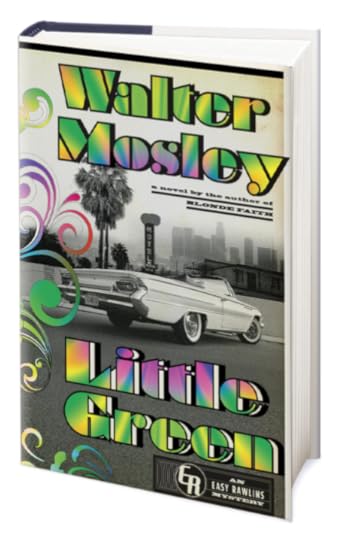 When Walter Mosley burst onto the literary scene in 1990 with his first Easy Rawlins mystery, Devil in a Blue Dress—a combustible mixture of Raymond Chandler and Richard Wright—he captured the attention of hundreds of thousands of readers (including future president Bill Clinton). Eleven books later, Easy Rawlins is one of the few private eyes in contemporary crime fiction who can be called iconic and immortal. In the incendiary and fast-paced Little Green, he returns from the brink of death to investigate the dark side of L.A.’s 1960s hippie haven, the Sunset Strip.
When Walter Mosley burst onto the literary scene in 1990 with his first Easy Rawlins mystery, Devil in a Blue Dress—a combustible mixture of Raymond Chandler and Richard Wright—he captured the attention of hundreds of thousands of readers (including future president Bill Clinton). Eleven books later, Easy Rawlins is one of the few private eyes in contemporary crime fiction who can be called iconic and immortal. In the incendiary and fast-paced Little Green, he returns from the brink of death to investigate the dark side of L.A.’s 1960s hippie haven, the Sunset Strip.
We last saw Easy in 2007’s Blonde Faith, fighting for his life after his car plunges over a cliff. True to form, the tough WWII veteran survives, and soon his murderous sidekick Mouse has him back cruising the mean streets of L.A., in all their psychedelic 1967 glory, to look for a young black man, Evander “Little Green” Noon, who disappeared during an acid trip. Fueled by an elixir called Gator’s Blood, brewed by the conjure woman Mama Jo, Easy experiences a physical, spiritual, and emotional resurrection, but peace and love soon give way to murder and mayhem. Written with Mosley’s signature grit and panache, this engrossing and atmospheric mystery is not only a trip back in time, it is also a tough-minded exploration of good and evil, and of the power of guilt and redemption. Once again, Easy asserts his reign over the City of (Fallen) Angels.
 “In 2007’s Blonde Faith, set in 1967, Easy Rawlins drove drunkenly off a cliff in what his creator indicated was likely his last appearance. Now, after two months of sliding in and out of consciousness, Easy begins the long journey back to the living, in Mosley’s superb 12th mystery featuring his iconic sleuth…. If there were an Edgar for best comeback player, Easy Rawlins would be a shoo-in.”
“In 2007’s Blonde Faith, set in 1967, Easy Rawlins drove drunkenly off a cliff in what his creator indicated was likely his last appearance. Now, after two months of sliding in and out of consciousness, Easy begins the long journey back to the living, in Mosley’s superb 12th mystery featuring his iconic sleuth…. If there were an Edgar for best comeback player, Easy Rawlins would be a shoo-in.”—Publishers Weekly (starred)
“Mosley fans were pining for the resurrection of Rawlins. Their dreams have come true…. Mosley returns here to doing what he does best: setting the pain and pleasure of individual lives, lived mostly in L.A.’s black community, within an instantly recognizable historical moment and allowing the two to feed off one another…. [A] major event for crime-fiction fans.”
—Bill Ott, Booklist
February 28, 2013
Fall of Heaven
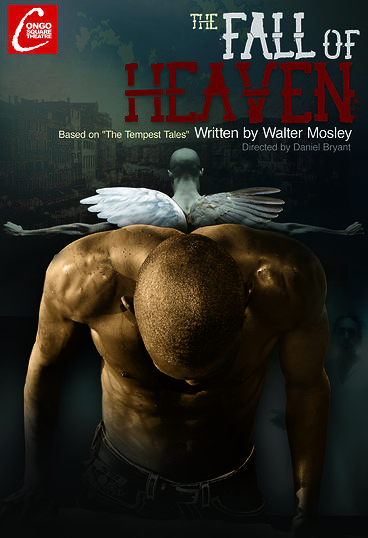 Congo Square Theatre’s
Congo Square Theatre’s
The Fall of Heaven
Written by Walter Mosley
Directed by Daniel Bryant
Featuring Anthony Irons
Feb 25, 2013 – Mar 24, 2013
For tickets:
Congo Square Theatre Company
2936 North Southport Avenue
Chicago, IL 60657
773.296.1108
In the blink of an eye, Tempest is struck by the bullet of a police gun and finds himself at the pearly gates facing St. Peter and his judgment. Refusing to accept his eternal condition, he’s stripped of his identity and given a new body and a chance to change his fate. Alive, Tempest was no angel, but he was far from evil. The Accounting Angel, Joshua, is out to prove the scales tip toward the latter. Adapted from his book, Tempest Tales, and inspired by Langston Hughes’ colorful character, Jesse B. Semple, Walter Mosley takes us on a hip trip—an ethereal excursion into the metaphysical conundrum between right and wrong, good and evil. Which will you choose?
Enjoy a sneak peek from a staged reading of The Fall of Heaven:
February 11, 2013
Camera in the Sun Interview
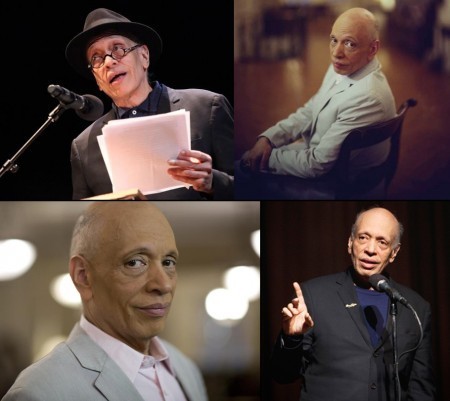 Walter Mosley is a New York City-based author, whose 37+ book literary career goes back to 1990′s Devil in a Blue Dress. That novel kicked off a series revolving around detective Ezekiel “Easy” Rawlins — a Black resident of the Watts section of Los Angeles, whose continuing story begins in 1948, and (with the May 2013 release of his 12th story,Little Green) has progressed to 1967. Mosley also created the character of ex-convict Socrates Fortlow, the modern-day protagonist of Always Outnumbered, Always Outgunned, and two other novels. Both Rawlins and Fortlow were adapted for the screen in the 1990s. Denzel Washington portrayed Rawlins in 1995′s Devil in a Blue Dress, directed by Carl Franklin. Laurence Fishburne portrayed Fortlow in 1998′s Always Outnumbered, directed by Michael Apted for HBO. During production Mosley met producer Diane Houslin, and in 2012 they partnered to launch a new production company: Best of Brooklyn Filmhouse. Other Mosley creations include Fearless Jones, portrayed by Bill Nunn in the final episode of Showtime’s anthology series, Fallen Angels. He has also authored several science-fiction stories — the latest being The Gift of Fire andOn the Head of a Pin, which were released together by Tor Hardcover in May, 2012. Camera In The Sun interviewed Mosley in the summer of 2012, as he was editing Little Green, and discussed how his books have been adapted for the screen — including past and future versions of Easy Rawlins.
Walter Mosley is a New York City-based author, whose 37+ book literary career goes back to 1990′s Devil in a Blue Dress. That novel kicked off a series revolving around detective Ezekiel “Easy” Rawlins — a Black resident of the Watts section of Los Angeles, whose continuing story begins in 1948, and (with the May 2013 release of his 12th story,Little Green) has progressed to 1967. Mosley also created the character of ex-convict Socrates Fortlow, the modern-day protagonist of Always Outnumbered, Always Outgunned, and two other novels. Both Rawlins and Fortlow were adapted for the screen in the 1990s. Denzel Washington portrayed Rawlins in 1995′s Devil in a Blue Dress, directed by Carl Franklin. Laurence Fishburne portrayed Fortlow in 1998′s Always Outnumbered, directed by Michael Apted for HBO. During production Mosley met producer Diane Houslin, and in 2012 they partnered to launch a new production company: Best of Brooklyn Filmhouse. Other Mosley creations include Fearless Jones, portrayed by Bill Nunn in the final episode of Showtime’s anthology series, Fallen Angels. He has also authored several science-fiction stories — the latest being The Gift of Fire andOn the Head of a Pin, which were released together by Tor Hardcover in May, 2012. Camera In The Sun interviewed Mosley in the summer of 2012, as he was editing Little Green, and discussed how his books have been adapted for the screen — including past and future versions of Easy Rawlins.
February 7, 2013
“Little Green” by Walter Mosley, National Author Tour
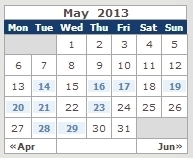 The dates have been announced for the Little Green National Author tour, May-June 2013 in the following cities; Los Angeles, San Francisco, Oakland, Seattle, Scottsdale, St. Louis, Austin, Houston, Philadelphia, Raleigh, Brooklyn, New York, Washington DC.
The dates have been announced for the Little Green National Author tour, May-June 2013 in the following cities; Los Angeles, San Francisco, Oakland, Seattle, Scottsdale, St. Louis, Austin, Houston, Philadelphia, Raleigh, Brooklyn, New York, Washington DC.
Browse the Events Calendar (to the right) or click “Appearances” to see a list of readings in your area.
Walter Mosley's Blog
- Walter Mosley's profile
- 3853 followers


